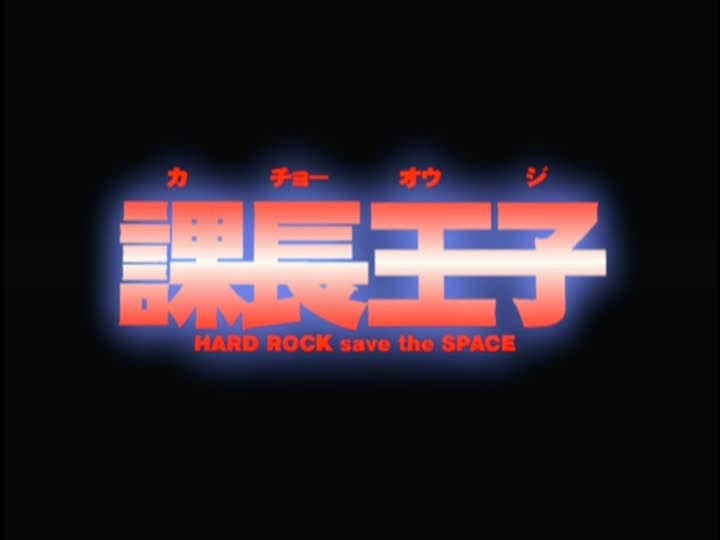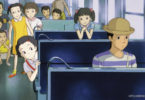“I’ve wondered if I will live to see the moment when accepted theories are shattered” (Hamil, ep. 13).
Kacho Oji (The Legend of Black Heaven, 1999) is a personalized love letter to the artists and patrons of yesteryear’s hard-rock era. A largely forgotten gem of the twentieth century, Black Heaven targets not only specific legends of rock and roll, but on a broader level the musical mythos of a previous generation. Like any true classic, however, Black Heaven is timeless in every sense of the word, existentially ‘Bazinian’ in its precise placement in time and simultaneous habitation outside of it. Traceable in no small part to its equally legendary production crew—including the likes of Kazuto Nakazawa and Hiroki Hayashi to name only a few—the series has a ring of authenticity to it, a heartfelt sincerity sought after by the dreamers of every generation. This mixture of nostalgia and optimism means Black Heaven is directed as much towards Millennial viewers (and any thereafter) as it is to those who have preceded them.
Though it is an inseparable component of its makeup, Black Heaven is fueled by far more than nostalgia alone (even if it does rely heavily upon it). As he is wont to do, series director Yasuhito Kikuchi excels at making the fantastic relatable and the mundane extraordinary. This is accomplished largely through (what would surely be) Campbell-endorsed symbolism and metaphor, but it is done so on an intimate level rather than keeping spectators at arm’s length. In addition to being perceptually ‘nearer’ to audiences, the figurative distance between the metaphoric constituents themselves is relatively minimal, exemplified by the absurdly clever premise that main character Oji “Gabriel” Tanaka’s guitar playing literally saves the Earth!
On top of the confusingly simple signs and metaphors gracefully intertwined within aforementioned premise there exists an extended allegory of profound ineffability throughout the narrative. The enigmatic “ultimate weapon” responds to Tanaka’s music on levels both empirical and immeasurable (much to the chagrin of lead scientist Hamil and the commanding officer Fomalhaut). As demonstrated by Hamil’s repeated experiments with recordings of Tanaka’s music, the secret to the weapon’s capabilities lies in live performances by Tanaka (and, of course, eventually the rest of his band Black Heaven), not merely the exact audio frequency from a secondary catalyst (e.g. a digital playback device). Here a profound point is interjected, the full implications of which are purposefully left to be drawn out by the viewer: the device is a technical construct, a detectable and observable object in existence; moreover, it responds with conspicuous apparentness to Tanaka’s “groove” (as he himself puts it), his emotions, and the ritualistic spirit of the rock show. It is an objectively real artifact which relies on subjective, unobservable criteria to operate—mind-body dualism in a nutshell. (It would not at all be frivolous to ponder the potential of the device having some form of sentience, as a theoretical exercise.) Obviously this is frustrating to the rationalist Hamil as she is confronted with a reality which can neither be defined by reason nor perceived by any quantitative sensory experience. For the viewer, rather than seeing Black Heaven as an existentialist manifesto, perhaps a more appropriate takeaway would be along the lines of the series’ aforesaid trademarks of distilling the profound and magnifying the ordinary. Over and over again, Black Heaven materializes in concrete terms an abstract truth which artists live with on a daily basis: real results, whether quantifiable in materialistic terms or not, can and do arise from the creation and expression of art.
Continuing along the lines of a singular, dominating allegory (one which, like a great river, has many distributaries), within the concept of the ineffable therein lie aberrant runoffs: disjunction, incomprehension and miscommunication. As much as Black Heaven is able to bridge generational gaps, it assertively propounds active thought concerning these divides, particularly (and not coincidentally) that which exists between Generation X and Generation Y (or, as previously called, Millennials, as their maturation coincides with the twenty-first century). There is perhaps no greater literal and symbolic dichotomy with which to sum up the divide between these two generations than that of an analog reality versus a digital one. Unbeknownst to many comprising today’s youth, much is in fact lost as we ‘advance’ through the bold new digital era (an undertone strummed ever-so-lightly throughout Black Heaven). As much as is gained, a comparable amount is lost—not only in superficial, sentimental terms, but also in objective technical specifications as well. With films (rarely shot on actual film anymore), tonal variances, time-honed compositing techniques and an indiscernible breath of actuality are all glossed over and otherwise simplified in favor of brightness, clarity and a palette of mutability suitable for post-production special effects. Similar reproaches are often expressed in musical circles as well, academic and amateur alike (though more than a healthful dosage of nostalgia is often interjected in the mix). Yet these disparities are lost in translation to those familiar with only one side of the comparison (i.e. those brought up in an environment largely absent of analog technology but saturated with digital devices). In the end, even the astute and highly educated encounter difficulties when attempting to articulate these traits to their children; it is the equivalent of describing colors to a person born blind. The ineffable: it is joyfully indescribable for the initiated, and frustratingly incomprehensible for everyone else.
This type of intellectual incapability is illustrated perfectly via the interactions between Tanaka and Fomalhaut. Prim and proper (not to mention literally from another planet), Fomalhaut expresses no desire for, and is likely incapable of, understanding precisely how Oji’s music activates the ultimate weapon. His subordinate Layla Yuki, acting as a liaison, attempts to relay—or, more appropriately, translate—Tanaka’s explanations; but even though Layla quotes Tanaka verbatim, concepts such as a groove or a band or even the luster associated with a live performance simply do not register for Fomalhaut. (Layla too has difficulty understanding initially, but through dedication and an open mind her appreciation for Earth music develops into genuine ability—a silent nod from the series to try new things.) Fomalhaut is focused solely on results; the lives of his crewmen and the denizens of the universe are on the line. Unlike Hamil, he chalks up any inability to grasp Tanaka’s gift as an inconsequential detail. Inferential knowledge obtained from Layla suffices as long as her investigation of Earth produces significant yields. Tanaka, in turn, is equally in the dark when it comes to fully realizing Fomalhaut’s position and the true stakes of his lifelong passion. Even after coming to grips with aliens ‘borrowing’ him and his role as Earth’s unknown savior, Oji plays his final heroic melody for the same reason he originally accepted Layla’s job offer and why he became Gabriel Tanaka of Black Heaven in the first place—like all true artists, he just wants to express himself; he just wants to play his Flying V.
Thus is revealed a satisfying metaphor—merely one among many—and along with it true testament that The Legend of Black Heaven was made for creative-minded individuals as much as it was made by them. In the professional world, where playtime meets deadlines and profit margins, a never-ending struggle exists between producers and artists: producers act as a driving force while the artistically inclined cling to their ‘babies’ (whatever type of creations they may be), ceaselessly wishing to add and refine. These two opposites (in this case, Tanaka and Fomalhaut) seem to repel one another, but they in fact need one another to function. They are the quintessential left and right brain conceptual caricatures—their functions differ, but they are both part of the same ‘brain’ (with an intercessor between, as Layla Yuki herself unknowingly assumes the role of managerial agent to her ‘client’ Oji Tanaka quite well). In this fashion, both in Black Heaven and the real world it emulates surprisingly well, a functional dynamic of checks and balances exists within the entertainment and publishing realms. Though tension and struggles inevitably ensue along the way, it is the concurrent pushing and pulling of these opposing forces that allow for a harmonious rendezvous of concept and product to occur…that, and the salvation of the universe.
© 2015
Originally posted here.




